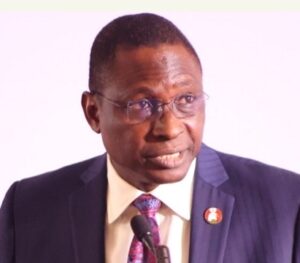EFCC Chairman: Nigerians Support Corrupt Leaders While Condemning Corruption
EFCC Chairman: Nigerians Support Corrupt Leaders While Condemning Corruption

Ola Olukoyede, the Chairman of the Economic and Financial Crimes Commission (EFCC), has highlighted a troubling paradox in Nigeria’s fight against corruption. While Nigerians openly criticize corruption, they often rally behind corrupt leaders when those leaders face legal accountability.
Olukoyede stressed that the persistent issue of underdevelopment could be addressed if citizens united to see corruption as a collective enemy. He noted that while many Nigerians acknowledge the harmful impact of corruption on the country’s systems, this recognition is not always reflected in their support for anti-corruption efforts.
Speaking during a meeting with officials from the Centre for Crisis Communication (CCC) led by Chris Olukolade in Abuja, Olukoyede emphasized that the fight against corruption requires broad public involvement. He said the EFCC’s success depends on public backing and collaboration from various sectors. “When we prosecute high-profile individuals, we often see people take to the streets in support of corrupt leaders. This sends the wrong message and undermines our collective efforts,” Olukoyede remarked.
The EFCC Chairman pointed out that no single agency can tackle corruption alone. He called for a joint effort, with society, government policies, and citizens’ welfare all playing critical roles in combating the issue.
On his leadership approach, Olukoyede shared that he has placed greater focus on prevention rather than solely on enforcement since taking office. He revealed that the EFCC has been leveraging intelligence gathering to achieve notable successes in its anti-corruption initiatives.
“We are emphasizing prevention, which is a key aspect of our mandate. We don’t have to wait for funds to be stolen before acting. To support this, I established the Fraud Risk Assessment and Control (FRAC) directorate, which works to prevent financial leakages,” Olukoyede explained.
The EFCC has also gained access to the government’s payment platform, GIFMIS, to track the allocation and use of public funds, ensuring capital projects are executed as planned. By focusing on prevention, the EFCC believes it can reduce the need for enforcement actions, which are often more costly and reactive.
While prevention remains a priority, Olukoyede assured that enforcement would continue to be a significant part of the EFCC’s efforts. He underscored that preventing corruption before it happens is not only more efficient but also more effective in the long run.
TRENDING SONGS
 RCCG PASTOR ANGRY OVER CALLING Him“MR” INSTEAD OF “DR,” DECLARES CURSE ONLINE
RCCG PASTOR ANGRY OVER CALLING Him“MR” INSTEAD OF “DR,” DECLARES CURSE ONLINE
 NPMA Appeals to Nigerian Government for Compensation After Lagos Market Fire
NPMA Appeals to Nigerian Government for Compensation After Lagos Market Fire
 Rest Every Four Hours, FRSC Issues Safety Guide for Fasting Motorists
Rest Every Four Hours, FRSC Issues Safety Guide for Fasting Motorists
 NNPC Boss Ojulari Bags UK Energy Institute Fellowship
NNPC Boss Ojulari Bags UK Energy Institute Fellowship
 Shock in Anambra: Bride Disappears Moments Before Wedding
Shock in Anambra: Bride Disappears Moments Before Wedding
 Nigerian Woman Returns ₦330 Million Accidentally Credited to Her Account
Nigerian Woman Returns ₦330 Million Accidentally Credited to Her Account
 APC Don Reach Morocco?’ VeryDarkMan Reacts to Seyi Tinubu Poster
APC Don Reach Morocco?’ VeryDarkMan Reacts to Seyi Tinubu Poster
 Bride Breaks Down in Tears as Wedding Meals Were Kept Secretly While Guests Go Home Hungry
Bride Breaks Down in Tears as Wedding Meals Were Kept Secretly While Guests Go Home Hungry
 Odogwu by Day, Robber by Night: How Marriage Joy Turned Into Tragedy
Odogwu by Day, Robber by Night: How Marriage Joy Turned Into Tragedy
 Nigerian Officials Allegedly Pocket N4–6B Weekly Through Smuggling Cartels at Seme–Badagry Border
Nigerian Officials Allegedly Pocket N4–6B Weekly Through Smuggling Cartels at Seme–Badagry Border
Share this post with your friends on ![]()













